Thermal Imager in Two Clicks. Buying High-Tech Electronics for russia Via Turkey and Kazakhstan Became Easier Than Ever
How the aggressor country's defence industry circumvents sanctions and who helps it
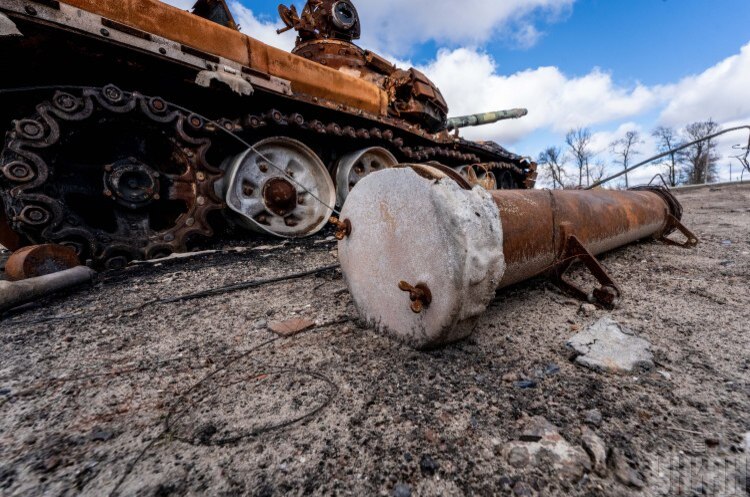
The sanctions list of companies that supplied russia with high-precision electronics for military equipment updates regularly. This is how the databases of companies sanctioned by the US, EUand UK look like, in particular. The latest trade statistics on sanctioned goods exports to russia, however, reveal that the existing sanctions lists include only a fraction of the total number of legal entities involved in illegal schemes. Is it really that simple to buy thermal imagers and microchips for the russian army? Mind investigated how shadow supply chains are built and who is involved.
More Tanks Needed
The number of tanks in the russian and Ukrainian armies as of the summer 2023 is roughly the same, even with the Ukrainian side having more: 1,500 versus 1,400, according to the Ukraine Support Tracker and Oryx analysts. But these figures do not reflect the full picture. After all, russia has an enormous stock of outdated materiel that can be upgraded and sent to the frontline.
It is through the modernisation of old tanks that russia plans to overtake Ukraine in terms of their quantity. Russian President vladimir putin said in 2022 that the output of the key types of armoured vehicles had more than doubled compared to last year.
Russian company Uralvagonzavod JSC, for example, not only equips 1990s T-90 tanks with thermal imaging cameras and laser rangefinders, but also upgrades much older T-62 models, manufactured from 1962 to 1975, with thermal imagers and sights.

A train of T-62 tanks in Melitopol, June 2022
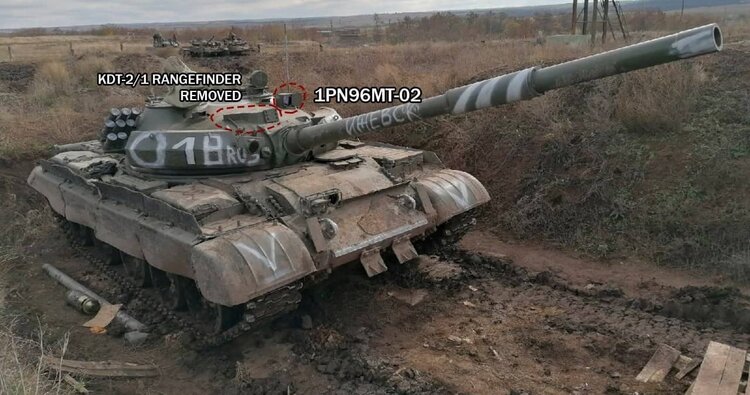
Along with its second-generation tanks, russia deploys in Ukraine upgraded T-62 tanks, whose production began in 1962. The modified T-72s are equipped with a 1PN96MT-02 thermal imaging sight with a target detection range of up to 2-3 km at night.
"The warmongers are planning to send more than 400 tanks to Ukraine. During this time, we are going to make new tanks and upgrade more than 1,600 existing ones, and the total number of russian tanks will exceed three times the number of tanks in Ukraine's Armed Forces, even more than three times," said russian President vladimir putin in response to the West's public plans.
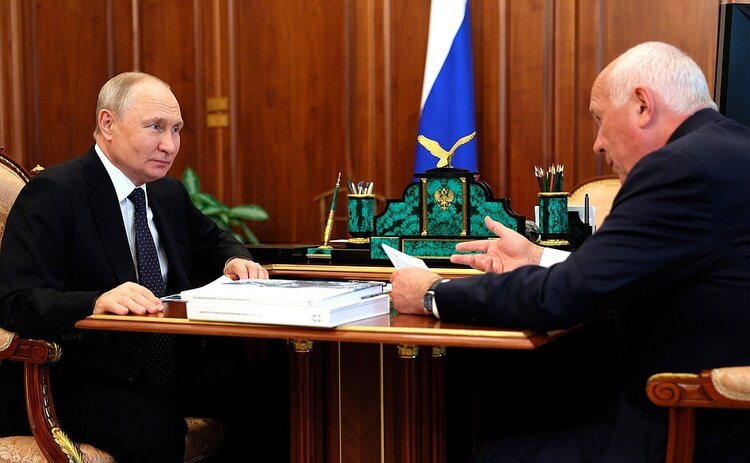
Rostec CEO sergey chemezov presents the company's annual report for 2022 to russian President vladimir putin.
Russian state corporation rostec produces 90% of the products used by the russian military during the war. Notwithstanding the fact that russia is under sanctions and is restricted in purchasing equipment, microelectronics and processors, sergey chemezov, the corporation's CEO, assures that they have "prepared options for addressing the problem."
In his words, the russian radioelectronics market has historically been dominated by foreign components. That is why companies have started their own developments and count on cooperation with "friendly countries."
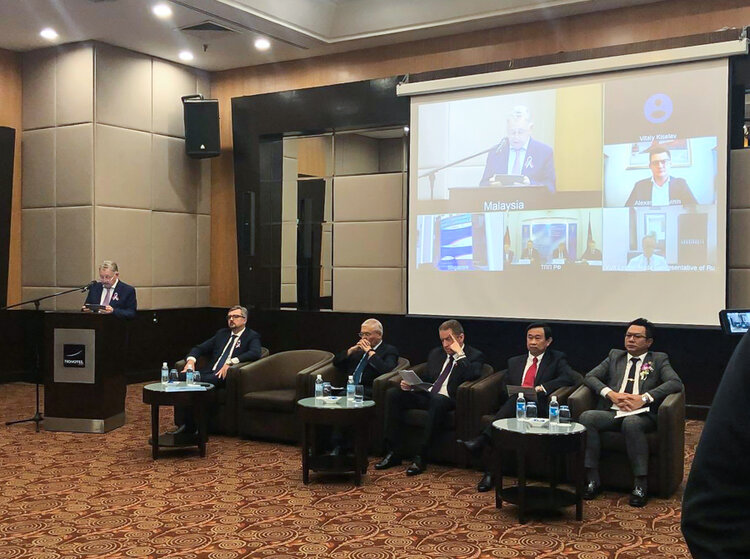
In 2022 and 2023, the sanctioned russian military conglomerate rostec has been aggressively negotiating to expand cooperation to obtain high technologies for military equipment with companies in Africa, as well as in Singaporeand China. In the photo, rosoboronexport company of rostec State Corporation is taking part in the EDEX-2023 International Defence Exhibition, which was held from 4 to 7 December 2023 in Cairo, Egypt.
To prevent a shortage amid the sanctions, russia simplified the import procedure for electronic devices into the country by the end of 2023. It is no longer necessary to involve the federal security service of the russian federation to document such purchases. This can now be done by ordinary industry associations, such as the Association of Electronics Developers and Manufacturers and the Association of Computer and Information Technology Enterprises.
And there were plenty of those willing to cooperate with the russian market with a minimum of bureaucracy.
"Every Transaction Is Legal"
On 23 February 2023, Salimjon Nasriddinov, a russian of Turkmen origin, congratulated his russian colleague Nikolay Goltsev on Defender of the Fatherland Day. The latter replied with a smiley: "Happy holiday to you too, my friend, we defend it (the fatherland – Mind) as best we can."
The SMS exchange took place thousands of kilometres away from the russian federation – in the United States of America. Both men were involved in a scheme to illegally supply high-precision electronics to russia for the military-industrial complex. In October of the same year, they were detained by the US law enforcement accompanied by their accomplice, russian Kristina Puzyreva.
“As alleged, the defendants evaded sanctions, shipping equipment to russia vital for their precision-guided weapons systems, some of which has been used on the battlefield in Ukraine,” stated Breon Peace, U.S. Attorney for the Eastern District of New York, “Individuals and companies in the Eastern District should know that our Office will use all tools available to prosecute those who evade sanctions to aid hostile nation states.”
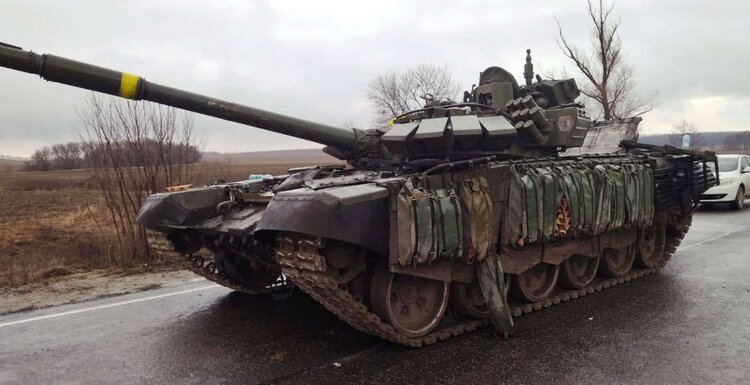
Certain electronic components and integrated circuits with the same manufacturer, model and part number sent by the defendants through SH Brothers were found in confiscated russian weapons platforms and radio equipment in Ukraine, including T-72B3 battle tanks. The photo shows a trophy T-72B3 tank in the Chernigiv Oblast.
According to US law enforcement estimates, this criminal group sent more than 300 consignments of prohibited goods to russia over the past year, worth approximately $7 million. At the same time, the shipments were not made directly, but through third countries, including Turkey, China and India. And this was just the tip of the iceberg, as the amount of electronics supplied to russia under this scheme is known.
As early as June 2022, the US Department of Commerce's Bureau of Industry and Security found that sanctioned goods were entering russia through countries such as Kazakhstan and Turkey. To block these shipments, the US and its allies have tightened export controls and imposed severe restrictions on the supply of Western microelectronics, on which russia's defence industry depends.
The United States monitors the export and re-export of dual-use goods that have been manufactured in the US, whether in full or in part. At the same time, the jurisdiction of the US regulatory authority extends to goods originating in the US, wherever they are located – both in the county and abroad.
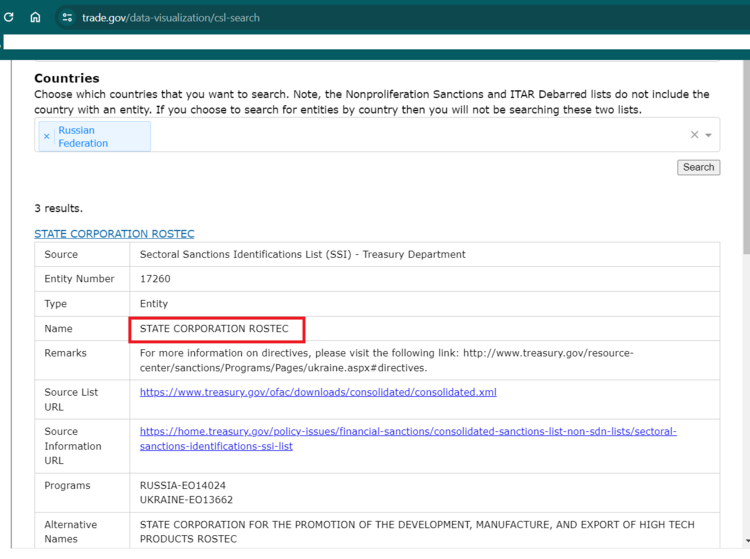
The US has a user-friendly system for finding sanctioned companies. The Consolidated Screening List (CSL) is a list of parties for which the United States Government maintains restrictions on certain exports, re-exports, or transfers of goods. Everyone who wants to cooperate with a foreign company can check online whether such cooperation is legal. If a company is listed, it means that doing business with it could result in problems with the law.
Mind has analysed the top 10 most exported goods from the category of sanctioned high-precision electronics to russia. In 2022, exports of these goods from Turkey alone reached more than $415 million, which is twice as much as in the previous year, the UN Comtrade international database shows.
And Turkish government reports indicate that in 2022, Turkey exported $11.2 billion worth of electrical machinery and cables, which is 18.3% more than in 2021.
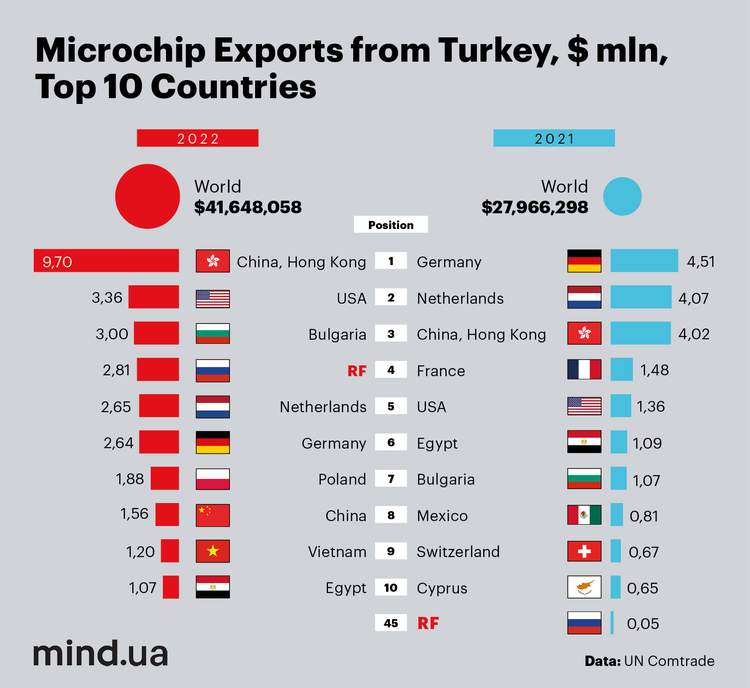
Nevertheless, only 12 Turkish companies are currently on international sanctions lists. This includes Azu International Ltd Sti. It was founded a month after the start of the full-scale russian invasion of Ukraine. And it had been operating for a year before being included in the US sanctions lists. During this time, the company exported at least $20 million worth of computer chips developed by American manufacturers to russia.
Turkik Union Dijital Teknoloji Donusum Ofisi AS created a website on the tenth day after the full-scale russian invasion of Ukraine. There was no direct mention of cooperation with russia.
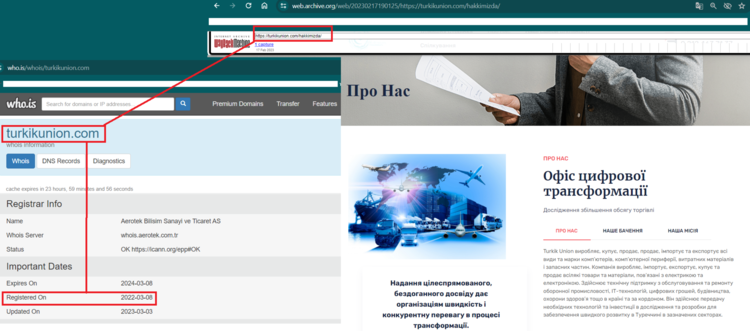
Turkik Union Dijital Teknoloji Donusum Ofisi AS created a website on the tenth day after the full-scale russian invasion of Ukraine. There was no direct mention of cooperation with russia.
Turkik Union's website is now down, and only in its archived version we found a brief description of its activities: "The company produces, imports, exports, buys and sells various goods and materials related to electricity and electronics. It provides technical support for the maintenance and repair of the defence industry, IT technology, digital money, construction, healthcare, etc. at home and abroad."
In total, almost 10,000 new companies emerged in Turkey in 2022 that export goods. And quite a few of them openly offer services for the double export of sanctioned goods to russia on their websites.
How Much Did Sales of Sanctioned Eectronics to russia Change in 2023?
Exports in January–September 2023 decreased by 19% compared to the same period in 2022. But cumulatively, the volumes are still impressive: sales for just ten commodity items over 9 months of 2023 amounted to $369 million.
And finding a supplier company to deliver sanctioned goods to russia takes just two clicks. For example, the website of the russian company Orlan, which has an office in the Turkish capital Istanbul, was listed in the top ten results for the "export of sanctioned goods Turkey russia" query on Google.
"Every transaction is legal. You pay directly to a Turkish company. The company is registered to a Turkish resident. All the reporting of the Turkish company is 'above board'," this website promises in the section on 'transportation of sanctioned goods'. "The essence of the service is the transit of goods through Turkey. A russian importing company transfers currency to a Turkish company. The Turkish company purchases the goods from a European supplier. The Turkish company's commission for this service is 5% of the invoice value of the goods, but not less than $500. The goods are then delivered to a customs warehouse in Turkey. The goods are stored there in customs transit. Then a shipment to russia is formed."
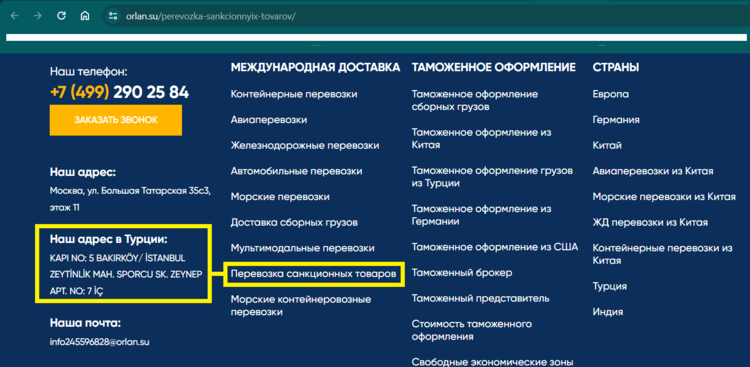
Googling "delivery of sanctioned goods to russia" in russian, one can find hundreds of russian-language websites of Turkish companies offering to bring any goods to russia on a turnkey basis for a small percentage.
The company claims to have been providing this service for over six months and having an office in Istanbul. This office's address is not any secret and is listed on the website's home page. The company's owners seem not to be afraid of a visit from the police. Moreover, even Turkish President Recep Erdoğan is happy about the rise in trade with russia.
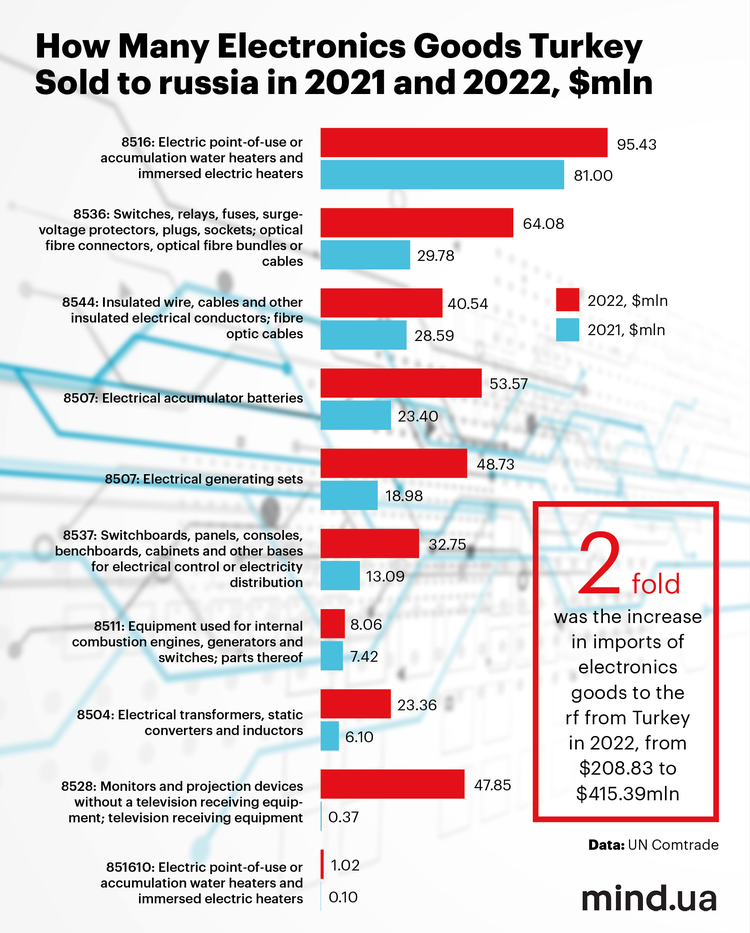
Turkey's position on the issue of circumventing anti-russian sanctions is vividly illustrated by Erdoğan's speech when announcing the 2022 foreign trade figures. He stressed that despite the russian-Ukrainian war, the pace of Turkish exports had not decreased but, on the contrary, increased: "We have turned these crises into opportunities and achieved the highest growth rates and exports in our history. (...) Now we have a Turkey that has expanded its horizons beyond its region to the global level. It can develop and implement its own free policies in every sphere and get results without imitating anyone or being subordinated to anyone."
Turkey's latest trade statistics prove that the country continues its pro-russian course: in January–November 2023, Turkey exported 25% more goods to russia than in the entire 2022.
In October of this year, putin and Erdogan met face-to-face for the 29th time in the last seven years. Symbolically, the meeting was held in Kazakhstan, which is another country that plays a crucial role in exporting high-tech products to the russian military.
Two Realities
At present, Kazakhstan has a public database of codes of commodities that are prohibited for export to the russian federation. This database’s website contains a reassuring caption: "This resource is for informational purposes only. The information is provided for the purpose of getting acquainted with the sanctions measures taken by third countries against the russian federation and the republic of belarus".
Commenting on the list, Serik Zhumangarin, Minister of Trade and Integration of the Republic of Kazakhstan, said that "we are working on it", and assured that companies transporting items such as microchips are under increased control. Nobody knows how.
The Kazakh authorities have also announced the launch of an automated online tracking system for imported goods entering Kazakhstan and their further movement as of 1 April 2023. However, no evidence of the existence of such a database has been provided to the public other than statements.
The official authorities of Kazakhstan do not disclose data on the volume of sanctioned goods supplies to russia. However, the UN Comtrade international trade database shows that exports of high-precision electronics increased tens or hundreds of times in many items in 2022.
For example, Kazakhstan exported $378,000 of rangefinders to russia in 2022, a record number over the past 20 years. To compare: in 2017–2019, the total worth of the commodity was less than a thousand dollars. And in 2020–2021, Kazakhstan did not export this product at all.
The supply of radar equipment to russia also skyrocketed in 2022, up by $2.1 million, 21 times more than in the previous year.
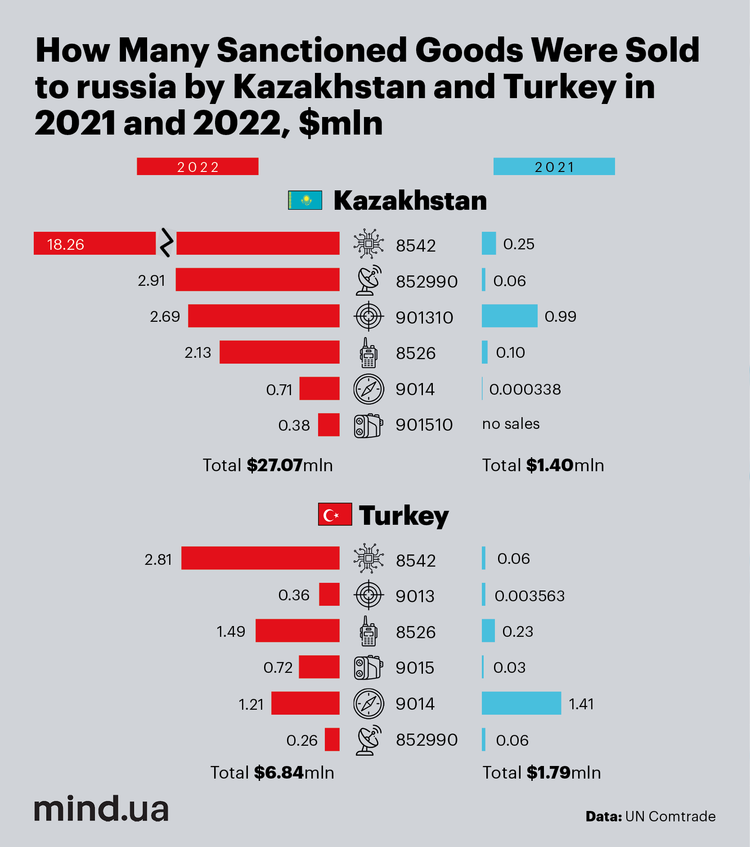
Governments that are friendly to Ukraine also monitor trade data. In August 2023, the US Department of the Treasury announced sanctions against the Kazakh company Defence Engineering that purchased dual-use goods from China and supplied them to russia via Kazakhstan.
The US authorities blocked all the company's property located in the US.
“In addition, persons that engage in certain transactions (...) may themselves be exposed to designation.” the Department of the Treasury warned. “Any foreign financial institution that knowingly facilitates a significant transaction or provides significant financial services for the individual designated today could be subject to U.S. correspondent or payable-through account sanctions”.
Unlike Turkish companies that were established a few days after the start of the russian aggression in 2022, Defence Engineering was registered in Astana in 2018 and had long been engaged in wholesale trade of a wide range of goods at real trading facilities with an area of more than 2,000 sq m.
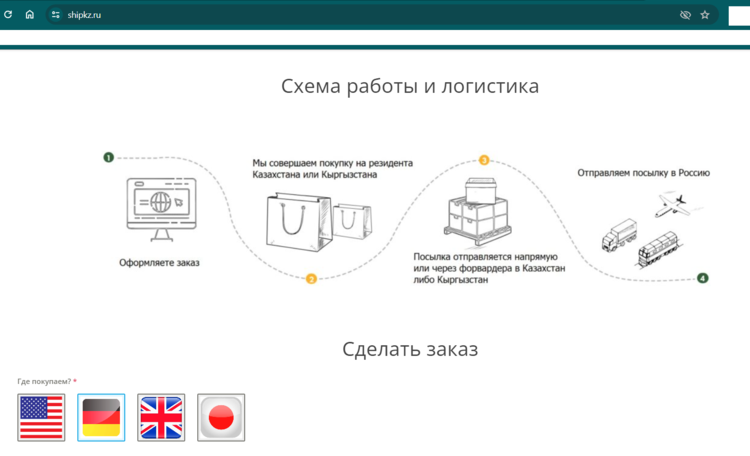
Logistics companies do not hesitate to show the chain of delivery of sanctioned goods to russia from the United States, Japan, the United Kingdom and Germany – via Kazakhstan.
In response to the announced sanctions against the company, the Ministry of National Economy of Kazakhstan said that the company's operations had been suspended a year before the war, in February 2021, according to their information. That said, the company was not issued any licences or permits for the shipment of specific products.
"We are in touch and in permanent contact with our Western partners. Appropriate measures to be taken against this company," the official press release concluded.
Two schemes for importing sanctioned goods into russia via Kazakhstan offered by the international company Standard Line LLC:
Scheme 1
- Our company in Kazakhstan purchases the necessary goods in a European country, then we enter into a sale and purchase agreement.
- The goods are delivered to Kazakhstan, customs clearance is performed there, and all duties and VAT are paid.
- We sell the goods to the buyer from russia without VAT.
- We deliver the shipment to the rf and refund the VAT to Kazakhstan.
Scheme 2
- The customer purchases goods in a European country. He enters into a sales contract.
- We deliver the goods to Kazakhstan and clear entry customs. The goods become available for free use.
- The customer sells the cargo to the buyer from the rf without VAT.
- We ship the customs-cleared goods or arrange insurance to cover the payment of customs duties.
- We deliver the shipment to russia.
The trouble is that only five Kazakh companies are on international sanctions lists because of the war with Ukraine. Three of them went on the sanctions lists as recently as August 2023 because of their assistance in selling dual-use goods from China to russia.
Statistics from Commodity Trade show that Kazakhstan broke all records for exports of sanctioned electronics to russia in 2022, compared to previous years. For example, in 2022, Kazakhstan exported 74 times more microchips to russia than in the previous year. This means that the number of companies exporting these goods should also have increased. Finding such companies on the internet is easy: a search engine for "delivery of sanctioned goods through Kazakhstan to russia" yields thousands of results.
"Delivering goods to russia through third countries (Armenia, Kazakhstan, etc.) is a more expensive and time-consuming option, yet in some situations it remains the only one possible," explains the website of the Artmarine freight forwarding company. "The point is that many container shipping lines do not currently accept cargo bound for russian ports or cancel the transit of goods from China, meaning that if your goods left China by sea and are in transit through Europe, they are likely to be delayed in European ports for an indefinite period of time. We can help you deliver such cargo from a European port by road, even if the goods are declared with 'sanction' codes."
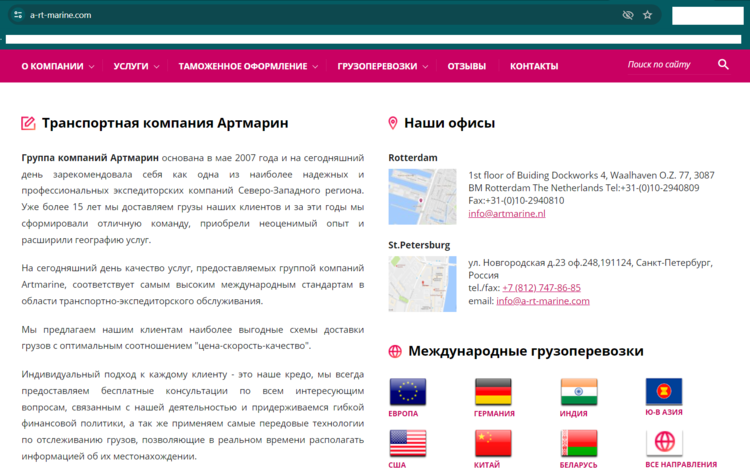
Artmarine has offices in russia and the Netherlands, and helps to supply sanctioned goods to russia
Does the export of electronics to russia really run without the goodwill of the "friendly states’" leadership?
Ashot Mkrtichev, director of the Kazakh company Defence Engineering, coordinated his actions with DPRK procurement officials, according to the US Treasury. The US law enforcement did not say anything about the agreements with the Kazakh authorities. At least, there were no such public statements.
Suppliers of products from Kazakhstan, speaking on the condition of anonymity, say that there is a so-called "green" list of companies on the border with russia: "No one will inspect your goods if you are on the list. And this list works not only on the border with russia, but also with China. The list is flexible: some companies are included, others may disappear, so it is very difficult to track which company is currently shipping sanctioned goods. Yesterday it was on the list, today it is not."
Mind asked the Ministry of National Economy of Kazakhstan to comment on this information. Our team waited for more than two months for a response to the request, but never received any.
The last statement on the export of dual-use goods was made in October this year. Republic of Kazakhstan's Ministry of Trade and Integration stated that no restrictions on the export of dual-use goods to russia had been imposed: "Trade relations between Kazakhstan and russia are regulated in full compliance with the provisions of the Treaty on the Eurasian Economic Union. There have been no bans on the export of any goods to the russian federation in connection with anti-russian sanctions."
Throughout the full-scale war, the law enforcement authorities of Turkey and Kazakhstan have never publicly reported on the detention of e sanctions regime violators. What they do to stop the export of electronics to the russian army is also unknown; the governments of these countries have not answered this question sent in our editorial inquiries.
If you have read this article to the end, we hope that means it was useful for you.
We work to ensure that our journalistic and analytical work is of high quality, and we strive to perform it as competently as possible. This also requires financial independence. Support us for only UAH 196 per month.
Become a Mind subscriber for just USD 5 per month and support the development of independent business journalism!
You can unsubscribe at any time in your LIQPAY account or by sending us an email: [email protected]


